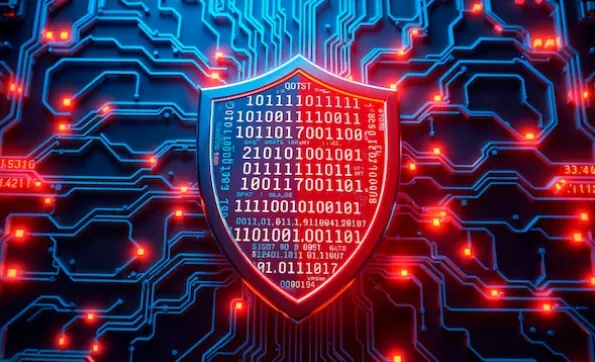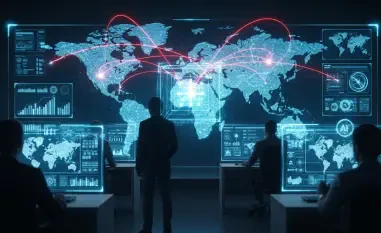Frans Majair had the pleasure of interviewing Malik Haidar, a cybersecurity expert with a wealth of experience in countering digital threats for multinational corporations. Malik has a deep understanding of how cybersecurity interplays with business strategies, offering an insightful perspective on recent geopolitical tensions affecting the industry.
Can you explain the process you experienced when you received the envelope from the American embassy in Jerusalem?
Receiving an envelope from the embassy was a surreal experience. Inside were personal letters addressed to me, my wife, and each of my children. These letters notified us that our visas had been revoked and cautioned us against trying to enter the U.S. The embassy even recommended that we bring our passports to them for the visas’ physical removal. This was especially tough because my son had plans for a semester abroad in the U.S., and my wife works for an American company, raising questions about how she could explain this sudden travel ban to her employers.
How did the visa revocations impact your family and the plans you had for the future?
The impact on my family was profound. We had to completely reassess our plans. My son’s educational aspirations were put on hold, causing a lot of disappointment and disruption. My wife’s career faced sudden uncertainties as she could no longer travel to the U.S. for work. On a personal level, we felt a strong sense of instability and vulnerability, questioning why this was happening and how it would affect our long-term future.
How has the revocation of visas affected other employees in your company or industry?
The impact on the industry has been widespread. Dozens of employees have had their visas revoked, leading to a great deal of fear and uncertainty. Everyone is anxious, wondering if they will be next. This has created a culture of silence because discussing visa issues is taboo; people are afraid of losing their jobs. Many who lost their U.S. visas were terminated immediately, as the ability to travel there is crucial in our field.
Has there been any official reason provided for the revocations of the visas of employees in Israeli offensive cyber firms?
No official reason has been given, which adds to the unease and confusion. While we haven’t received a direct explanation, it’s widely understood that this is part of a broader campaign to constrain Israel’s offensive cyber capabilities. The lack of transparency from the American side makes it difficult to address or challenge these measures effectively.
Can you describe the atmosphere within the offensive cyber sector following these visa cancellations?
The atmosphere is tense and fearful. Many are worried about their job security and the future of their careers. Losing the ability to enter the U.S. has far-reaching consequences, essentially making someone unemployable by many international firms. This fear has led to a kind of hysteria, as people are scared not only of losing their jobs but also of the reputational damage that comes with these visa issues.
Why is the loss of a U.S. visa considered grounds for immediate termination in the high-tech sector?
In high-tech and cybersecurity, international collaboration is key. Many projects involve travel to the U.S. for meetings, conferences, or working directly with American clients. Not being able to travel freely restricts one’s role significantly and makes it impractical for companies to continue employment. Therefore, losing a U.S. visa can indeed be grounds for immediate termination.
How is the American decision to prohibit IDF officers from entering the U.S. affecting the IDF and strategic operations?
Prohibiting IDF officers from entering the U.S. is more symbolic but still impactful. While the IDF can adapt without these officers making work visits to the United States, the broader consequence is felt in the cyber sector, where preventing skilled personnel from entering the U.S. could have a detrimental long-term impact on strategic and collaborative security operations.
What specific measures have been taken by the American government to constrain Israel’s offensive cyber industry?
The American government has taken several measures over the years, including adding Israeli companies to the Entity List, which restricts their ability to do business with American firms. They’ve also enacted visa cancellations and imposed regulations intended to limit the export of cyber tools. These actions collectively squeeze the operational capabilities and market access of Israeli cyber firms, pushing them towards collapse.
How have Israeli companies like NSO Group, Candiru, and Quadream reacted to the American sanctions and actions?
These companies have faced substantial challenges. NSO Group and Candiru have lost clients and personnel, and Quadream has ceased operations altogether. The companies are struggling to maintain their workforce and clientele under these pressures. Some have considered selling to foreign interests, further depleting Israel’s cyber capabilities.
How significant is the threat of collapse facing the Israeli offensive cyber industry?
The threat is quite serious. Without the ability to operate freely and the added pressure of visa cancellations, many companies are at the brink of collapse. If the industry loses its workforce and continues to face such stringent restrictions, it could very well lead to a complete downfall, which would not only hurt the economy but also weaken national security.
What implications does the American acquisition of Israeli companies have on the future of Israel’s offensive cyber capabilities?
American acquisitions signal the transfer of critical cyber capabilities out of Israeli control. This shift means that the intellectual property and technological advancements developed in Israel could be used to strengthen U.S. capabilities instead, effectively draining Israel of its cyber prowess. Long-term, this compromises Israel’s position as a global leader in offensive cyber technology.
What motivates the American targeting of Israeli offensive cyber enterprises?
This is driven by a complex mix of factors including superpower rivalry, commercial interests, and ethical considerations. American tech giants, facing their own regulatory pressures, push back against competitors like Israeli companies. There are also concerns about human rights and violations which these cyber tools can contribute to. Additionally, there are geopolitical strategies at play, aiming to gain a competitive edge.
Can you explain the relationship between superpower interests, trade, security issues, and anti-Israeli sentiments among U.S. officials that may influence this visa policy?
The visa policy reflects a blend of superpower dynamics and internal politics within the U.S. There’s a perceived need to curtail Israel’s competitive edge in offensive cyber technologies, supposedly to preserve American dominance. Additionally, some U.S. officials with anti-Israeli sentiments may use their influence to shape policies that impact Israel negatively. Trade and security interests also play critical roles in these decisions.
What interests do tech giants such as Facebook and Apple have concerning the offensive cyber operations and industry?
Tech giants have a vested interest in curbing competition from offensive cyber operations. Firms like NSO Group compete directly with the data and privacy models that companies like Facebook and Apple promote. These tech giants are under scrutiny for privacy concerns and hence, they leverage their influence to put pressure on companies that they see as threats to their business models or to enhance their own standing.
How have internal conflicts within Israel weakened its cyber industry from within?
Internal conflicts, including strained relationships between the intelligence community and cyber companies, have significantly weakened the industry. There’s competition for top talent, and sometimes ethical disagreements about the use of cyber tools further impair cooperation. This lack of unity undermines efforts to protect and strengthen the industry.
How has Israel failed to protect its offensive cyber industry and workforce?
Israel’s failure lies in not anticipating the full scope of actions required to shield its cyber industry from international pressures. The government could have imposed supportive regulations or provided more robust backing against foreign sanctions. The industry’s talent drain could have been mitigated with better incentives and support structures.
What were the long-term consequences of the cyber industry’s collapse on Israeli national security, illustrated by the attacks on October 7, 2023?
The long-term consequences are profound. The October 7 attacks revealed vulnerabilities that had been exacerbated by the industry’s decline. The erosion of offensive cyber capabilities meant Israel was less prepared and less equipped to counter sophisticated digital threats, highlighting the critical need for a robust and protected cyber sector for national security.
How has the murder of Saudi journalist Jamal Khashoggi impacted American policy towards Israeli cyber companies?
Khashoggi’s murder brought intense scrutiny to the ethical use of cyber tools, especially those that can be used for surveillance. Israeli companies found themselves in the crosshairs as potential enablers of these human rights violations. The policy shift has been towards more stringent controls and sanctions against companies involved in these sorts of controversies.
How did international organizations’ investigations implicate Israeli companies in illegal monitoring activities?
These investigations brought to light various instances where Israeli cyber tools were used for illicit surveillance of journalists, dissidents, and activists across the globe. These findings tarnished the reputation of implicated companies and drew significant international censure, leading to consequential regulatory and trade restrictions.
What effects did the Commerce Department’s November 2021 announcement have on companies like NSO and Candiru?
The announcement effectively barred these companies from trading freely with American firms, limiting their market and operational scope. The “Entity List” designation branded them as risks to U.S. national security, which led to clients viewing them as toxic and employees leaving due to mounting uncertainty.
Why did American officials believe that Israeli cyber companies were undermining U.S. interests?
They viewed these companies as threats because of their capabilities to breach security on a scale that could destabilize international relations, privacy, and security frameworks. There were also concerns about cyber tools being sold to governments that used them for repression, which juxtaposed against U.S. interests and values.
What was the Defense Ministry’s initial response to American sanctions, and why did this response fail?
The Defense Ministry’s initial response was to engage in dialogue and implement tighter regulations on the marketing of cyber tools. However, these measures were seen as inadequate because they failed to fully alleviate American concerns or support Israeli companies effectively, leading to continued pressure and restrictions.
How did political leaders like Naftali Bennett, Benjamin Netanyahu, and Ron Dermer handle the crisis within the offensive cyber industry?
Their responses varied, but generally, they attempted to engage diplomatically with the U.S., although with limited success. Bennett sought to navigate restrictions safely, while Netanyahu and Dermer focused more on other geopolitical issues, showing less proactive engagement with the cyber industry crisis.
What practical consequences did the addition of NSO and Candiru to the “Entity List” have on the offensive cyber industry in Israel?
This list addition damaged the reputations of these companies, led to a significant loss of clients and talent, and created a stigma for the entire industry. Having leading firms branded as security threats crippled industry morale and pushed key talent and resources out of Israel.
Do you have any advice for our readers?
Stay informed and vigilant about the interplay between cybersecurity and geopolitics. The balance of power in cyber capabilities affects not just national security but global stability. For professionals in the field, it’s crucial to stay adaptable, seek new opportunities, and advocate for ethical practices that can withstand international scrutiny. For others, be aware of how these global shifts can impact personal and business security.













